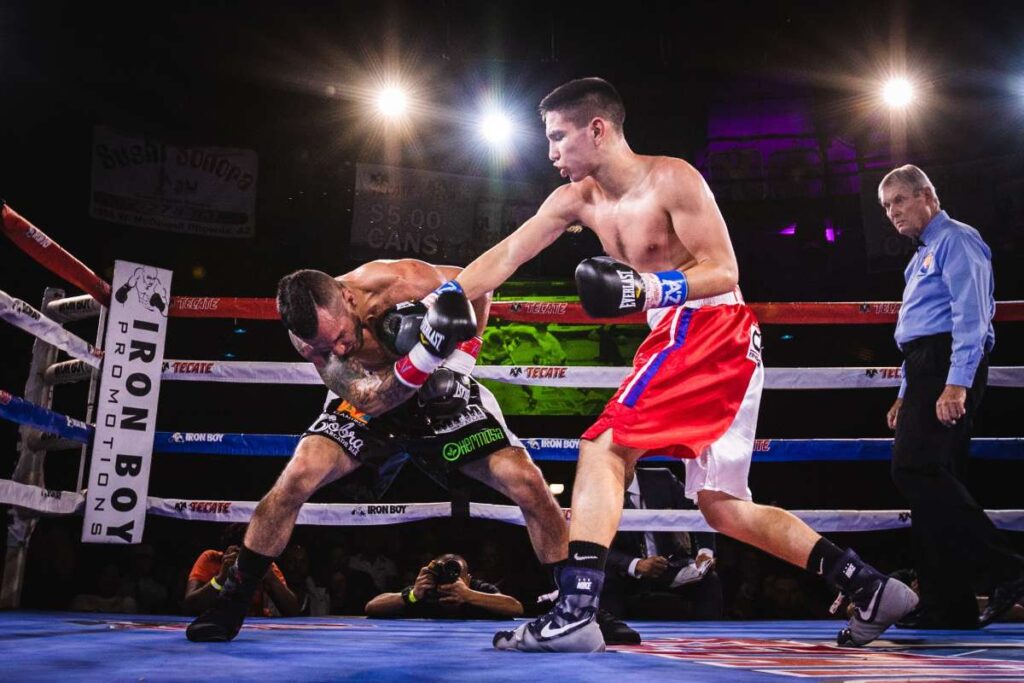From the heydey of Muhammad Ali and Evander Holyfield in the second half of the 19th century, boxing in America has gone a long way. Unfortunately, Mixed Martial Arts has stolen much of the 20th century's splendour (MMA). One thing, though, has remained constant: the widespread use of boxing analogies and catchphrases in everyday speech.
Even if boxing isn't as well-liked as it once was, the act of fighting with your hands, or pugilism, is so ingrained in our culture that we might not even be aware that we frequently use slang from the gentleman's game. In addition, the terminology used to describe the various motions in boxing might be perplexing.
Boxing is a sport that is despised and avoided by almost half of the population and receives little coverage on the sports pages, but it continues to be the sport that has given rise to the most idioms and catchphrases in our language overall, especially during this election year by those who write and broadcast about politics.
Many well-known fighters emerged from the worst, most hopeless circumstances. Additionally, boxing occasionally puts us in a terrible, tragic, and bone-crushing situation. It makes their bodies and our weaknesses widely visible. It requires the most heinous physical cruelty known to humankind, as well as a keen grasp of the mind and a tonne of bravery and compassion.
Boxing has developed a specific vocabulary over the years to define boxing weights, styles, gear, and the many punches and kicks employed in the sport. This page will be helpful if you're wondering what they mean when they talk about lightweight, bantamweight, speed bags, and sparring gloves. For those who desire to, in the words of Muhammad Ali, "float like a butterfly and sting like a bee," boxing terms or jargon will also be helpful.
Announce each fighter individually. Start with each fighter's first name and then say his nickname, followed by his last name. State their current weight, record and boxing team, plus any titles if applicable. Do not add commentary, such as which fighter you prefer.
Saying the names twice originally started many, many years ago. Back in the day, some of the speaker systems weren't that great, and guys would call out the name once and then do it [again to a different part of the arena], so guys can hear it on the other side".
The role of the referee
Determines when to start or stop a count when a fighter is down. Determines when a foul is so egregious that a warning should be given or points are taken away—signals when the round is over. Determines when more blows will endanger one fighter's health, and thus, stops the fight.
Similarly, in life, when some people land low blows in the form of comments, behaviours, or a combination of the two, in most cases, they initially deny landing the low blow. The sport of boxing is a metaphor for life in ways we can relate to, no matter where we are from, who we are or what we do.
We hear it all the time: boxing can change your life. Whether you get in the ring or not, boxing training teaches discipline, work ethic, self-control, and self-confidence. In addition, it teaches you about yourself.
FAQs
Idioms From The World Of Boxing
Martial arts like boxing have been practised since the time of the ancient Greeks and have long been a part of human culture. So it comes as no surprise that several phrases from this well-known sport have idiomatic and permeated common speech. Some sound so authentic and natural that it is difficult to pinpoint where the original boxing term came from.
You Get What You Put In
Frequently, commentators may say something to the effect of "Now we shall see who put roadwork in" late in very close bouts.
This implies that it will become clear who put in the necessary, difficult work and who did enough to get by. Life is the same way. The day will come when you are at the metaphorical final stages of your life.
It will soon become clear if you put in the hard work or just enough to get by.
The Bell saved him
Early boxing regulations were the source of the phrase before it became the name of a well-known TV series or a phrase for when you "caught a lucky break." The boxer can stumble, be helped, or crawl to his corner and have time to recover if a punch and the referee knock them out before they can reach the count of 10 before the bell that signals the end of the round rings. Consequently, the count is stopped. In a sense, he is "rescued by the bell." In addition to boxing, it has come to imply that you somehow "got off the hook" or that you disobeyed destiny.
Respect Is Not Given; It Is Earned
Respect is a rather simple idea in "conventional" thinking. It would be best if you first respected in order to be respected. The philosophy underlying respect is very different in boxing, though.
Respect in boxing refers to landing a punch so strong that your opponent "respects" the outcome of trying to assault you. Ringside coaches and spectators can be heard urging competitors to earn their "respect."
Respect, though, is essential. Thus, having it or not having it is a significant issue.
I'm In Your Corner
Every fighter who is successful has a solid corner. This rule does not have any exceptions. Equally important is the idea of having a terrific corner in life.
A metaphor for life is boxing.
We all require the support, criticism, and accountability of others. That is if we wish to develop.
Below The Belt
In a fight between two fighters, it is forbidden to land "low blows" below the beltline. The fascinating thing about low blows is that they can only be identified by the referee who is officiating.
Almost always, the combatant who received the low hit protests it vehemently. Similarly to this, when people inflict low blows on others through their words, actions, or a mix of the two, they frequently deny doing so at first.
No matter where we are from, who we are, or what we do, boxing is a metaphor for life in ways we can all connect.
That Killer Instinct Is In Him
This expression was first used to characterise boxer Jack Dempsey in the 1930s because he entered the ring with an unusual level of uncontrollable wrath. Dempsey's "take no prisoners style" sparked a newfound passion, captivated everyone's attention, and revealed the true severity of the sport in a society where boxing had previously been referred to as a Gentlemen's Sport and Manly Art. Unfortunately, the phrase "killer instinct" has subsequently come to be associated with people who have an unwavering determination to succeed and businessmen who seek to win at any cost.
He Knows The Ropes
Nearly everyone is aware that boxing contests are held in square rings with four ropes and that the participants demonstrate high levels of skill, intelligence, and strategy. To put it another way, they "know the ropes" or "know their way around the ring." Anyone who fully comprehends a situation or is knowledgeable about their field is referred to as "know the ropes" in today's society.
You Beat Them To The Punch With That One
Although the meaning of this ubiquitous expression in boxing is evident, it is now used to describe any situation in which one person "gets the upper hand" on another or initiates action rather than being struck first.
It would be best if you occasionally rolled with the punches
Fighters practise anticipating incoming punches early and moving with them to decrease the force of the blow rather than embracing contact. The term "rolling with punches" has become widely used to describe this boxing manoeuvre. It has evolved into a saying that exhorts individuals to "go with the flow," not get bogged down in the particulars, and to be adaptable. Both inside and outside the ring, it's wise advice.
You'd Better Toe The Line
The phrase "get your act together" or "straighten up" is essentially a quote from Jack Broughton's original Seven Rules of Boxing. This former bare-knuckle boxer created seven rules for participants to follow in 1743 to "civilise" the sport. No champion can be considered defeated, for instance, until he collapses as he approaches the finish line within the allotted time, according to rule #4. "Placing one's toe on the line" has now gained widespread use and acquired its current meaning in English.
Groggy
The word "sleepy" or "out of it," as we currently use it, originally meant "intoxicated" and was derived from grog, a vintage alcoholic liquor. Groggy, which means "dazed," comes from the boxing ring and means "weak in a battle," leading to stagger, shaky, and unstable behaviour.
Palooka
While we might describe someone as being foolish, oafish, or uncoordinated, the term "palooka" originally referred to a subpar prizefighter. The editor of Variety magazine, Jack Conway, is credited with coining the phrase "prizefighter" sometime around 1926. The oafish connotation of the word was made more well-known by the 1920s comic Joe Palooka, which portrayed a dim-witted fighter with a good heart.
Punch-Drunk
This phrase, which means "dazed and bewildered," first appeared in boxing slang to describe a fighter knocked out by too many headshots. Later, the term "punch-drunk" began to refer to chronic traumatic encephalopathy, a brain disorder frequently observed in boxers.
Roll With The Punches
The fighting technique of shifting or rolling one's head and body away from a hit to diminish its force is the origin of the expressions "roll with the punches," "ride with the punches," or "adapt easily to difficult conditions." Being soft or withdrawing one's punches is similar to a fighter pulling back to decrease the force of a blow.
Throw One's Hat In The Ring
Tossing in the towel denotes giving up, whereas throwing one's hat into the ring denotes readiness for combat. This practice dates back to at least the early 1800s, a time when most men wore hats, and it would have been safer than attempting to be heard above a rowdy, argumentative throng.
Throw In The Towel
Throwing in the towel is a figurative expression that means to give up or quit.
The expression "throw in the towel" comes from boxing and denotes an outright admission of loss. For instance, a boxer's staff member in the corner may toss a towel into the ring when the boxer is being beaten to signify that the fight is finished and that he is admitting defeat. Throwing in the sponge to signal defeat and end a match was an earlier technique.
Boxing Rules 101: 'Throwing in the towel' doesn't end a fight.
In professional boxing, there is a widespread fallacy that a corner has the authority to end a fight at any time by simply walking out of the ring.
'Throwing in the towel' is a common term in English that denotes an early defeat.
For example, the candidate was far Before the election and chose to give up after falling behind in the polls.
Throwing in the towel is a boxing term with a century-long tradition—and a big mistake.
When their fighter begins to suffer a brutal beating in Rocky IV, Apollo's cornerman begs Rocky, Apollo's head trainer, to quit the fight. Even today, cornermen will occasionally throw a towel into the ring as a gesture of submission because they believe this would terminate the fight immediately.
But things don't work like that.
A fight can only be broken up by the referee. Unfortunately, I have witnessed 'alert and judicious' referees toss the towel back into the corner and permit the altercation.
Although the corner's recommendation or a towel toss occasionally influences the referee's decision to stop play, he is well within his rights to disregard either.
Why do coaches just give up?
It denotes giving up, caving in, or admitting defeat. It originated from the habit of a boxer's coach tossing their towel into the boxing ring to indicate that the match should end because they have conceded defeat when a boxer is too hurt to continue.
Is throwing in the towel a knockout?
The customary way a boxer concedes defeat is when his opponent is given a technical knockout by his opponent's second, who throws a towel or sponge into the ring.
Does throwing in the towel mean giving up?
Defeatist surrender. "After losing the election, he threw in the towel on his political career" is a phrase borrowed from boxing, when a combatant signals surrender by tossing a towel into the ring.
Can referees ignore towel throws?
The referee has complete discretion in disregarding a corner's surrender and tossing it back out. Fourth, it is up to the referees to decide whether to "call the foul," subtract a point, or disqualify the corner that pulled the fight to an end by throwing in the towel.
Why Do Refs Say Protect Yourself At All Times?
Every time he completes his pre-fight instructions, the referee says it. It is crucial to a fighter's success and safety that it has evolved into a common phrase in boxing. It says exactly what it means but is far too frequently disregarded. Let's recap what the third man in the ring means when he says PROTECT YOURSELF AT ALL TIMES, as it appears that many fighters seem to have lost their sense of self-preservation.
Look back at the boxers from the 1970s, 1980s, and 1990s and count how many of them touched gloves in the middle of the ring when the referee told them to do so, aside from just before the final round (where he supervised the contact). This occasionally occurred, but not to the same extent as modern fighters. It has evolved into a politeness that is inappropriate for prizefighting. After the conflict, treat your adversary with respect and become friends. The only form of sportsmanship that should be demonstrated up until the final bell is rung is a clean, fair bout. The fans must get the battle they paid for from the boxers. Not a romantic romp.
Ultimately, it's up to you to ensure your safety
There are many decent, honourable, and honourable boxers, but let's face it, some boxers could care less about acting professionally, and others are willing to go to any lengths to win, even if it goes against the rules of fair play. Take these easy precautions to safeguard yourself at all times and in all ways imaginable since it would be foolish to approach this activity with any other idea in mind.
To the best of his abilities, the referee's job is to keep the game under control and enforce the rules. But in the end, it's up to you to make sure of your security, protect your health, and be ready to steer clear of cheap shots at all costs.


